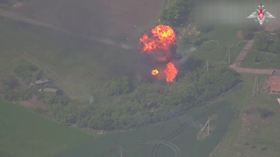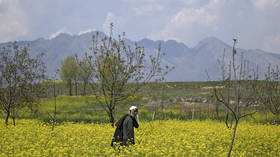Chaos at Chinese-Russian border as increased sanitary requirements to halt spread of Covid-19 cause backlog of 70 cargo trains

With Russia and China becoming more closely linked economically, the free flow of cargo between the two nations is essential. But in the last year, measures to stop the Covid-19 pandemic have caused mayhem at border crossings.
Since late last year, China has been holding train traffic at the border due to epidemiological restrictions, causing a pile-up of timber, coal and fertilizer. In particular, this has affected the crossing at Zabaykalsk, a small town located on the Sino-Russian border and a stone's throw from Manzhouli, a city in Inner Mongolia.
According to Moscow daily RBK, which spoke to representatives from Russian Railways, traffic allowed to pass through has been reduced, and increased epidemiological requirements have been placed on the cargo itself. In particular, in the last few months, China has stopped accepting Russian certificates of sanitary treatment and is conducting its own checks.
Also on rt.com Russian agricultural exports surge as trade with China growsThis means that, on the Russian side of the border, there are now over 70 trains waiting to cross, including more than 20 container trains.
Covid-19 difficulties have also plagued Russia's fishing industry. At the end of 2020, the authorities in Beijing decided to almost entirely close Chinese ports for the unloading of frozen fish as a measure to combat the pandemic's spread. According to Russian official Yuri Trutnev, this is hurting the country's fishermen as more than 70% of Russian fish is caught in the Far East, and much gets sold to Beijing.
"The fishing industry is one of the backbone industries in the Far East," Trutnev said, earlier in 2021. "This year, we have faced difficulties because of the ban on the import of our exported products to China, where 60% of Russian fish was imported."
Earlier in March, a report from the country's Ministry of Agriculture revealed that, in the first two months of 2021, exports of agricultural products from Russia reportedly grew to more than $4.1 billion. This is a 35.8% increase compared to the same period a year ago. Part of that increase is due to China increasing its purchases, which so far have totaled $741 million.
Think your friends would be interested? Share this story!














